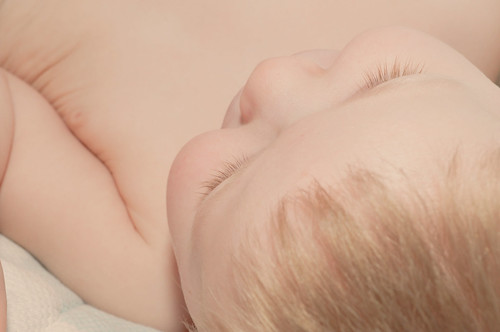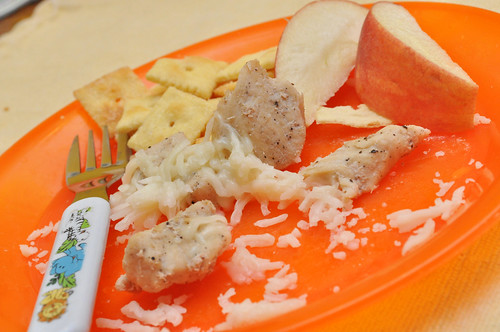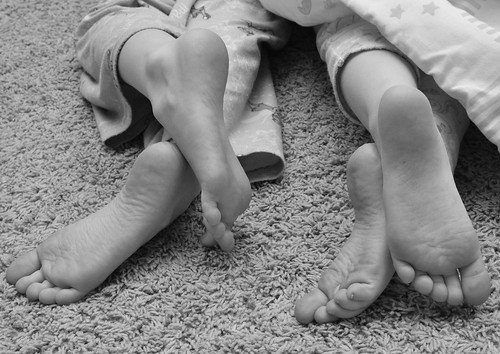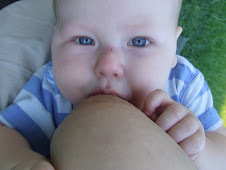2.24.2010
A Day (or 4) in the life...
I have a feeling the constant will develop as a catalog of days spent with my babies. So far, on day 4, here are the results:
2.18.2010
The Co-sleeping Conspiracy
 While pregnant with my first baby, I didn't think much of babies "needing" to sleep anywhere. Yes, we bought a crib and yes, the intention was to have her sleep in it, but I never thought of it as something she HAD to do. It was natural for us, from the very beginning, to snuggle in my bed. After she'd fallen asleep I'd sometimes lay her in her crib, only to bring her in bed with me at the first night time waking. This was just easier, for both of us. Less waking up for her and more z's for mom. Eventually, she naturally slept alone in her crib/bed without needing to come in to mine.
While pregnant with my first baby, I didn't think much of babies "needing" to sleep anywhere. Yes, we bought a crib and yes, the intention was to have her sleep in it, but I never thought of it as something she HAD to do. It was natural for us, from the very beginning, to snuggle in my bed. After she'd fallen asleep I'd sometimes lay her in her crib, only to bring her in bed with me at the first night time waking. This was just easier, for both of us. Less waking up for her and more z's for mom. Eventually, she naturally slept alone in her crib/bed without needing to come in to mine.The same happened with baby number 2. I just gave birth to this precious little thing, that last thing on my mind was being separated from her! I wasn't breastfeeding, but that didn't matter. I was able to snuggle close to her, watch her breathing, comfort her while a bottle was made and keep her warm. Again, she naturally "weaned" from co-sleeping to sleeping in her crib. Both of the girls never had a problem napping in their cribs or even sleeping the first portion of the night there.
While pregnant with my son, my third baby, I began to see a lot of debate show up on co-sleeping. Either I never really paid attention to or noticed it before but apparently, it was a huge controversy. There are even campaigns that slander co-sleepers and parents are almost always blamed in co-sleeping deaths, while crib deaths are referred to as "SIDS". I was pretty shocked, to be honest. I had never researched co-sleeping (during my first two pregnancies I didn't research anything at all!) but I just knew there was nothing dangerous about it. I didn't consume alcohol and then sleep with my babies. I always was careful with pillows and blankets. The once heavy sleeper I was in my high school years disappeared as soon as I became a mom and I was aware of every move my babies made in bed. I didn't see the big deal.
For new parents, there can be a lot of information to take in. We constantly get well meaning, but sometimes awful, advice from family and friends. Many people gasp if you mention you sleep with your baby and they are quick to tell you about all the dangers.
But here's the thing: there are always SAFE and UNSAFE ways to do things, especially co-sleeping.
NEVER:
*Drink alcohol or use drugs and then co-sleep with your baby/child.
*Take medications that make you drowsy (this includes types of cough syrup, tylenol pms, sleeping aids, benadryl, etc)
*Use an excess of pillows and/or blankets.
*Pull the blankets up too far or over baby's head.
*Place your newborn between the wall and you.
ALWAYS:
*keep baby off pillows (mostly for newborns)
*Avoid overly stuffed blankets
*Be aware of where baby is at (when you stir or wake up, check on baby, just as you would in their crib).
For those of you about to become parents, do not worry about what people will think. It IS ok to take your baby to bed with you. Practice common sense safe sleeping, in cribs AND your own bed, and do not be ashamed to say you co-sleep with your little one. Motherhood is tiring and those first few weeks and months are not only an adjustment period but a learning experience. You may swear you'll never co-sleep only to find out it's the only way TO sleep. As with anything else, make sure you have ALL the info. Babies sometimes inexplicably pass away and yes, some babies are killed due to UNSAFE co-sleeping. If you do it, do it safely.
Happy sleeping!
2.11.2010
What's in Breastmilk?
What's in Breast Milk?

The American Academy of Pediatrics (AAP) strongly recommends exclusive breastfeeding for the first six months of life. It is optimal for both babies and mothers. For babies it can protect against infections and reduce the rates of later health problems including diabetes, obesity, and asthma.
For mothers breastfeeding helps the uterus to contract and bleeding to cease more quickly after delivery. Breastfeeding can reduce the risk of breast and ovarian cancer and also provides a great way for mothers to bond with their babies.
Find a Lactation Conultant in Your Area
The advantages of breastfeeding are numerous. Breast milk is ultimately the best source of nutrition for a new baby. Many components in breast milk help protect your baby against infection and disease. The proteins in breast milk are more easily digested than in formula or cow’s milk. The calcium and iron in breast milk are also more easily absorbed.
The following is a brief overview of the components of breast milk and the nutrients they provide for your baby.
Proteins
Human milk contains two types of proteins: whey and casein. Approximately 60% is whey, while 40% is casein. This balance of the proteins allows for quick and easy digestion. If artificial milk, also called formula, has a greater percentage of casein, it will be more difficult for the baby to digest. Approximately 60-80% of all protein in human milk is whey protein. These proteins have great infection-protection properties.
Listed below are specific proteins that are found in breast milk and their benefits:
- Lactoferrin inhibits the growth of iron-dependent bacteria in the gastrointestinal tract. This inhibits certain organisms, such as coliforms and yeast, that require iron.
- Secretory IgA also works to protect the infant from viruses and bacteria, specifically those that the baby, mom, and family are exposed to. It also helps to protect against E. Coli and possibly allergies. Other immunoglobulins, including IgG and IgM, in breast milk also help protect against bacterial and viral infections. Eating fish can help increase the amount of these proteins in your breast milk.
- Lysozyme is an enzyme that protects the infant against E. Coli and Salmonella. It also promotes the growth of healthy intestinal flora and has anti-inflammatory functions.
- Bifidus factor supports the growth of lactobacillus. Lactobacillus is a beneficial bacteria that protects the baby against harmful bacteria by creating an acidic environment where it cannot survive
Fats
Human milk also contains fats that are essential for the health of your baby. It is necessary for brain development, absorption of fat-soluble vitamins, and is a primary calorie source. Long chain fatty acids are needed for brain, retina, and nervous system development. They are deposited in the brain during the last trimester of pregnancy and are also found in breast milk.
Vitamins
The amount and types of vitamins in breast milk is directly related to the mother’s vitamin intake. This is why it is essential that she gets adequate nutrition, including vitamins. Fat-soluble vitamins, including vitamins A, D, E, and K, are all vital to the infant’s health. Water-soluble vitamins such as vitamin C, riboflavin, niacin, and panthothenic acid are also essential. Because of the need for these vitamins, many healthcare providers and lactation consultants will have nursing mothers continue on prenatal vitamins.
Carbohydrates
Lactose is the primary carbohydrate found in human milk. It accounts for approximately 40% of the total calories provided by breast milk. Lactose helps to decrease the amount of unhealthy bacteria in the stomach, which improves the absorption of calcium, phosphorus, and magnesium. It helps to fight disease and promotes the growth of healthy bacteria in the stomach.
Breast Milk is Best
Breast milk has the perfect combination of proteins, fats, vitamins, and carbohydrates. There is nothing better for the health of your baby. Leukocytes are living cells that are only found in breast milk. They help fight infection. It is the antibodies, living cells, enzymes, and hormones that make breast milk ideal. These cannot be added to formula.
Though some women ultimately are not able to breastfeed, many who think they cannot actually are able to breastfeed. Lactation consultants are able to provide support to women learning to breastfeed. For those who are not able to breastfeed, milk banks can be an alternative.
Compiled using information from the following sources:
Breastfeeding the Newborn: Clinical Strategies for Nurses. Biancuzzo, Marie, 1999.
Bestfeeding: How to Breastfeed Your Baby. Renfrew, Mary et al, 2004.
2.08.2010
Diaries of a Milk Maid
During the short time I breastfed Maggie, I didn't enjoy it. I was told that cracked and bleeding nipples were part of the horrors of breastfeeding, and so when mine became cracked and bloody, I nursed through it, and of course, hated the experience. I wasn't informed by anyone that the choices I made, even in birth, could affect our nursing relationship or that just one bottle could be the beginning of the end. At that point in time, I don't know that having the information would have changed any of my choices anyway. For me, I think I had to take that path and make those choices. It has aided in the way I've formed my current opinions.
You see, I've been there, I've done that. I'm not looking down on women who were given poor advice or lack(ed) the information available. I didn't have it myself. I have been on all sides of the spectrum: I nursed and switched, I exclusively formula fed and I exclusively breastfed. When I say "I know how you feel" in regards to breastfeeding and formula feeding, I mean it.
Thankfully, despite not getting the best start in life, my girls are thriving and healthy. That's wonderful. I didn't see that and say to the indisputable scientific fact "This is untrue, my kids are FINE, therefore, formula does not decrease overall health!". No, instead I said, "This is amazing, interesting information. How lucky I am that my girls don't have (insert health issue, like asthma, diabetes, childhood obesity, etc) for not receiving breastmilk." But, just because my girls came out unscathed didn't mean I couldn't do my best to give my next baby an even better chance at a healthy start to his life. I made it my mission to succeed at breastfeeding. That mission started while I was pregnant with my son.
I read EVERYTHING. I joined breastfeeding forums to see what problems real women were facing with breastfeeding. I read "The Womanly Art of Breastfeeding" from cover to cover like it was the breastfeeding bible. I posted concerns and sought help, before I could even have a problem. I figured, the issues with breastfeeding in the past, for me, were all due to lack of information, so I armed myself. The worst thing, I imagined, would be to have an issue arrive, and try to find the answer at that time, rather than avoiding the issue to the best of my ability, or having the answer already.
I learned my nipples cracked and bled with my first daughter because she wasn't latched properly. A baby who's properly latched will not cause that kind of pain or damage. The only thing that should be expected is initial soreness, for the first few weeks and a slight discomfort at latch on. Once your baby is suckling away, it shouldn't hurt. If it does, it's not right. Learn about proper latch while pregnant. It's ok to have to "learn" to breastfeed. It's natural, but you and your baby will both have to be teachers and believers in each other.
I also learned that scheduling was not only unnecessary, but could hurt my supply and our nursing relationship. When you have a newborn, their stomach is only the size of a marble, and by 1 week the size of a pingpong ball. You cannot expect so much to fit in there. This is why your newborn will nurse almost constantly, because it can only take so much at a time. I didn't resent nursing every 1-2 hours, knowing this is what my baby needed and WHY he needed it.
Weight loss and weight gain are always on a parent's mind. Many babies will lose 10% of their birth weight while in the hospital. This is normal, I learned, and no cause for concern. I also found that when you're receiving IV fluids in labor, your baby is going to have water weight, so they aren't actually losing as much as you think. Wet and poopy diapers were the best way to gauge my newborn's intake, and there were definitely plenty of those!
I could write a book on this information (which is why La Leche League has done that with the womanly art of breastfeeding) because there is a solution or explanation to almost EVERY scenario in the breastfeeding world, you just have to know where to find that info!
If I had to limit my advice to the single most important factor in successful breastfeeding, it would be preemptive education/prevention. You don't search for the answers to the questions on your test while you're taking it, you prepare for it. You study, you perfect your knowledge the best you can with all the resources available. Breastfeeding should be no exception, if you truly wish to succeed. You'll find your breasts aren't too small or too large; that your baby may nurse every hour for 45 minutes or every 3 hours for 15; That your baby doesn't know how to latch right away and it may take 1 try or 100 tries. The one constant, the one truth, is that less than 3-5%(depending on the source) of women can truly not breastfeed their babies exclusively, so chances are, the issues you might be facing, can be worked through. You just need the tools.
2.05.2010
Dinosaur Vs. Bedtime
It was pretty heart breaking but I know that this is what is necessary for us at this point. I do not intend to wean Alex. I fully support him nursing until he's done, however, it's become more than an obsession and it's caused him to get little sleep, and me as well. I do not want the last part of our nursing relationship to be frustrating. I also do not want to resent his need to keep nursing, which is what I was beginning to feel.
I noticed in the last 2 nights that he actually stayed asleep longer before waking up asking to nurse. Night #1 he woke up frantic, flailing and screaming for it, but last night when he did finally stir, simply crawled into my bed and groggily asked to nurse. I let him. He also hasn't nursed at all today, and is currently napping. I do hope it doesn't lead to him weaning fully, I just want to cut down this night nursing...I cannot do it all night long, work part time, homeschool my older child and take care of them all day (and night, now that my husband works graveyards again).
So, tonight when it's time for Dinosaur to go to bed, I hope the roaring is down to a minimum and maybe we'll shave another 15 minutes off of that bedtime. He seemed to enjoy being sung to sleep last night, telling me "That's a good song, mom" after hearing "Twinkle, Twinkle" 3 times. :)
2.02.2010
Circumcision: The Uncut Version
Sadly, many new parents do not even research circumcision. This is just as disappointing to me as when they choose to keep their sons intact, but do no research and therefore don't care properly for them. When we just blindly make decisions, especially those about our children's health (Vaccinations, elective surgeries, feeding, etc) we aren't just hurting ourselves, or our kids...but the population as a whole.
If you circumcise your son because it's "Just what everyone does" what other things are you going to alter in the name of popularity? Will you get your daughter a boob job in high school if "everyone else is doing it" according to rumor? Because that's all that myth is, a rumor. Roughly, only half of US boys are being circumcised today. In some areas, like the West Coast, that number is as low as 30%. But, I won't make an argument for something as important as circumcision based off of location. After all, perhaps you're on the East coast which boasts a disgustingly high circ rate of 90% in some areas. And after all, you may move someday.
I'd much rather convince you of the ill effects of infant circumcision with FACTS. To do so, I'm going to list common pros that are given in favor of circumcising young infant boys. Then, I'm going to explain why they're bull shit.
"My husband is circumcised, I don't want him to wonder why he doesn't look like daddy"
-This is a very common reason for wanting to circumcise an infant. But, let's just think about this for a second. What other body parts of your husband's need to match? If your son's ears are different, are you going to alter them? No. And hey, your son won't have the same genitalia as you, but you'll explain that to him, that boys and girls look different. So why not explain to him that his daddy had a surgery as a baby to remove his skin, but you didn't do that to him because *insert whatever reason here, like "You were born perfect".* I can tell you that your son, if he has any questions at all about dad's privates, will probably be more interested in why he has pubic hair and why daddy's penis is bigger than his. You don't go around performing elective surgeries on people so they match. We're all different and unique...this should involve a life lesson, not scalpels.
"All his peers will be circumcised and I don't want him teased in the locker room."
-If a child is going to be teased about something, there's little you can do to prevent it. He could be teased for having a small penis...you're not going to get it enlarged. Plus, this excuse works on the assumption that guys are going to be checking each other out in the locker room. In the rare event that someone were to poke fun at your kid for having a foreskin, there are many retorts your son could shoot back, like "Why are you checking out my junk, jealous?" or "At least I'm not lacking in that department and have my whole penis." There's no reason to alter your perfect infant because someday, someone in some random situation may tease him. Plus, I remind you that the circ rates are dropping, drastically. The boys of today are being left intact, much like the rest of the world (85% of the men in our world have their foreskins).
"Well, those two reasons aside, it's better for his health. It's cleaner, it's easier to clean and he won't spread STDs as easily."
-No, no, and, no. To understand this you have to first understand how the foreskin functions. In infant boys, the foreskin is fused to the glans (head of the penis) much like your finger nail is attached to your finger. When your baby pees, it flushes out the inner part of the foreskin (and remember that urine is sterile) so this works to keep your son clean. Also, by keeping his foreskin, you prevent feces from his diaper from touching his urethra or getting under his foreskin, and therefore, prevent the chance of him getting foreign bacteria in his urinary tract. Older studies suggested that circumcised boys were less likely to get UTIs. There are more studies that show no difference and others that show that intact boys get them less often. Regardless of what the truth is, girls are more prone to UTIs than either circumcised OR intact boys, and we treat them with proper hygiene and antibiotics, no surgery.
Now to clean, let's imagine this: An intact boy requires NO special care. Because the foreskin is fused to the glans, you do NOT retract it, ever. This could cause pain, tears, and adhesions. Instead, you wipe only what you see, like you wash your finger. If you circumcise your infant, you'll have much more to do. During the healing process, you'll be taking care of a wound, in a diaper. Afterward, you'll have to clean any skin that was still left very thoroughly so that he doesn't get an infection. You may also have to worry about the freshly cut skin trying to heal back to the glans, usually resulting in adhesions. Advice on this varies from "do not retract" (like in intact boys) to "you must retract to prevent the adhesions or break them" so there's really no TRUE information on what to do. When the intact boy retracts naturally (sometime between infancy and puberty, but most commonly toddlerhood) he can retract, rinse and replace at bathtime. No soaps, just water. No harder than if he lacked foreskin.
As far as STDs are concerned, no study really has the truth established. Those that say intact men are at greater risk, or rather carriers, of more infections (like HPV) are grossly incorrect and make little sense. The most commonly quoted study is about a group in Africa, where they taught the freshly circumcised men safe sex practices and provided them with condoms, but not the group they left intact. They also didn't factor that the freshly circumcised men weren't having sex while their penises healed. They found that the intact men contracted HIV more often than their cut counterparts, based on their poor approach of collecting this data. This study was, on top of it all, cut short (no pun intended). We can also look at the population of America and conclude this study makes no sense. Our own HIV/AIDS rate is quite high to that of other industrialized counter parts, yet, we have an astoundingly high circumcision rate (about 90% of grown men in the US are circumcised, as this was the rate about 20-some years ago). So, how is it that we have such a high rate of HIV/AIDS when we also have such a high rate of circumcision? That makes no sense...
On top of that, to argue in favor of surgery on infants, to possibly reduce the risk of STD transfer in adults is irresponsible. Instead, we need to teach our children how their bodies function, how STDs are transferred and contracted, and push safe sex. THIS is what will protect your son or daughter, not a false sense of protection because they were circumcised (or their partner is).
"But uncircumcised penises are soooo gross!"
-Really? How attractive is YOUR genitalia? If a man you were really in to took you home, and you started to fool around, and he caught a glimpse of your goods and never called you again because it was "so gross" he'd be labeled an asshole. Most genitals are not very attractive, female or male; circumcised or not. We are all made differently and none of us "match". To discount a person because they have foreskin is incredibly shallow. Just like a man discounting a woman for having an extended clitoris, longer labia, or not having her clitoral hood removed is shallow.
There is nothing gross about the state of a man's (or infant's) natural penis. This is how they are SUPPOSE to look; without tight skin or dark circle scars. We tend to be afraid of what we don't know, but that doesn't make it's ok. It's just ignorance to how a penis is suppose to look. If your son's toes were oddly shaped and ugly, you wouldn't remove them. They are part of him, and you love every bit.
"Well, I've never actually seen one. I didn't mean it was gross looking because of the skin, I meant because of all that nasty stuff that builds up in there!"
-If you've never seen one, how do you know it's nasty? Oh, because of rumors and stigmas surrounding intact men in America. Well, we're talking about infants, for one. Remember how I said the glans and foreskin were fused? Yea, there's nothing "building up". And, the "stuff" is called smegma. This is a natural lubricant produced by the body, you have it too. It's your discharge. It keeps your pH balance normal, it keeps you lubricated for sex, it keeps your skin there soft. Everyone needs to practice proper hygiene, circumcised men included. In the end, a dirty penis is a dirty penis. Most intact men take extra care to keep themselves clean, partly because there is such a stigma about having a foreskin. In order for smegma to build up, the man needs to really lack in caring for his man bits, and this would probably be no different if her were circumcised, and I doubt you'd put EITHER penises in your mouth. But again, we're talking about infants, and whether you need to worry about his for YOUR son...so again, the answer is no. For the first portion of his life, his foreskin is self cleaning, after that, you teach him how. After that, it's up to him whether he'll be a slob or a Mr. Clean kinda guy. Regardless, it's nothing to remove body parts over.
"If it was unnecessary, they wouldn't do it."
-Many insurance companies, and state medicaid, are no longer covering circumcisions. Certain hospitals have banned the procedure as well. I've heard, first hand from friends/aquaintances, quotes in the range of $350-$1500 to have the surgery performed on their newborn. The reasons given "It is not medically necessary, it is a preference." My co-worker and I were discussing this issue one day. She was telling me that she had taken him (her son) to the pediatrician to get it done, because the hospital didn't perform the. The pediatrician told her the procedure was not covered by her insurance because it was considered a cosmetic surgery, and it would cost them $400. She debated it, but he told her that there was absolutely no reason to do it, that many boys today aren't getting circumcised, and told her proper care (not to retract). He's 5 and while her intentions walking in to the pediatricians office that day were to circumcise him without a thought or any research, she told me how happy she is that it wasn't covered and that he remained intact. I'm pretty sure he'll be happy about that, too!
If there are any other reasons you've heard for someone wanting to circumcise, I'd love to hear them. If you've been considering it and are still confused, have more questions, etc I would love to address that.
There are so many decisions for new parents to make, and it's important that you're informed. What I found when researching circumcision was that EVERY pro-circ benefit could be debunked with medical facts. That was enough for me. Why expose my perfect newborn boy to the risks of bleeding, pain, MRSA staph infection, decreased sensitivity and genital integrity if there were no benefits to it?
For a great first time parent article, check this out: http://www.circumstitions.com/Itsaboy.html
Here's a group of doctors opposing circumcision: http://www.doctorsopposingcircumcision.org/
For a quick, easy fact-checking decision maker, look at this: http://circumcisiondecisionmaker.com/
To find out why this group is fighting for baby boy's rights, go here: http://www.intactamerica.org/
Already raising an intact son (or pregnant with one who'll stay that way) join us here:
*Raising Intact Boys* on cafemom.













